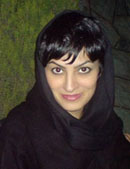New York, April 1, 2010—The Committee to Protect Journalists is alarmed that several Iranian journalists continue to be held in inhumane conditions at the notorious Evin Prison. At least one journalist is reported in deteriorating health, and two are under severe duress to “confess” to charges that could bring execution.
The daughters of Badressadat Mofidi, the prominent Iranian journalist and secretary of the banned Iranian Journalists Association, have published a letter describing the appalling conditions in which their mother is being held. Mofidi has been held in solitary confinement and deprived of phone calls and family visits for several months, according to the letter. Mofidi’s family also expressed concerns about her deteriorating health. “She suffers from a heart condition and is being given strong tranquilizers as the interrogations are causing her a great deal of stress and exhaustion,” her daughters wrote. Mofidi’s lawyer has not been able to meet with her or gain access to her file.
Mofidi was arrested on December 29 after discussing the government’s press policies in an interview with the Persian service of the German public broadcaster Deutsche Welle. No formal charges have been disclosed against her.
In a separate development, two journalists working for the Committee of Human Rights Reporters (CHRR), Shiva Nazar Ahari and Kouhyar Goudarzi, have been under sustained pressure during their interrogations to deliver televised “confessions” to heresy charges, according to the Committee of Human Rights Reporters.
Goudarzi has already been formally charged with heresy, a capital crime. Visitors to Evin Prison earlier this year reported that Goudarzi’s head was bandaged, although it was not clear how he sustained his injuries, according to the reformist online publication Rooz Online. Nazar Ahari, thus far charged with illegal congregation, has spent more than 60 days in solitary confinement and has been threatened during interrogation with execution, according to the Committee of Human Rights Reporters.
“We are concerned about the health of our imprisoned colleagues in Iran,” said Mohamed Abdel Dayem, CPJ’s Middle East and North Africa program coordinator. “Tehran’s treatment of imprisoned journalists is in violation of the most elementary provisions of the law. The authorities are solely responsible for the physical and mental well-being of every journalist in their custody.”
CPJ research found that at least 52 journalists were behind bars in Iran as of March 1.
